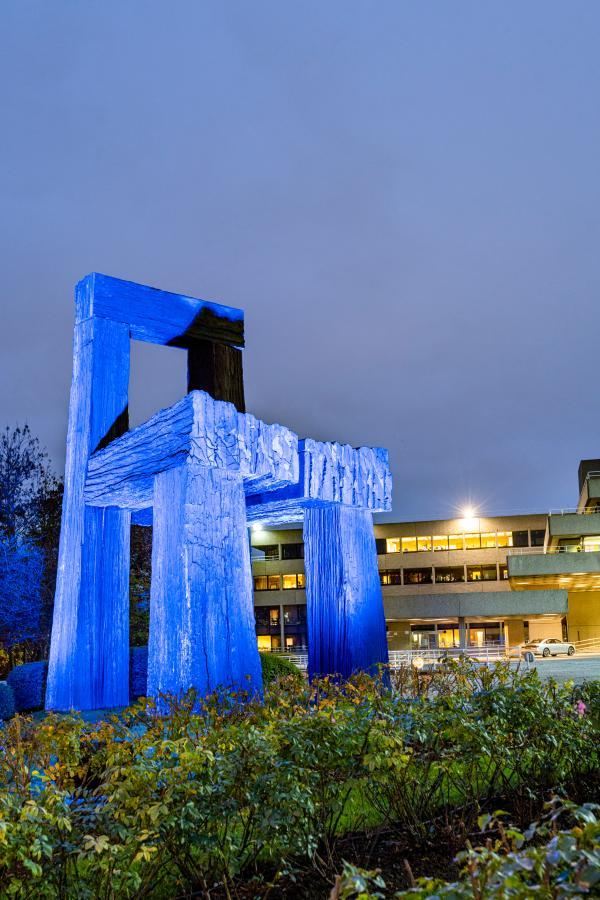
The Chair, the monumental work of art that marks the entrance to the European Investment Bank's headquarters in the Kirchberg district of Luxembourg City is lit up in blue for World Children's Day 2021.
With this symbolic action, the EIB wishes to show again its commitment to the cause of children and reiterate its support for UNICEF, both internationally and for the Luxembourg team in its host country.
Beyond its beautiful visuals and communication initiatives, the GoBlue campaign marks a day to honour all the children throughout the world and take stock of all that needs to be done to uphold their rights.
At the EIB Group, the policies we develop and our activities for the investment projects we support aim to create a better world for the children today and for the future generations.
The EIB and UNICEF have a partnership aiming to increase access to quality education and reducing the impact of climate change on children. Under a Memorandum of Understanding (MoU) the two institutions committed to jointly investing in quality education and skills training for the most vulnerable children and to scale-up community-based climate adaptation initiatives in schools and health facilities.
Whether at COP or other conferences with international partners or in our everyday work implementing our Climate Bank Roadmap through the thousands of projects that we support here and beyond Europe's borders, in the world’s poorest regions, we aim to safeguard and improve children’s environment and living conditions.
We finance healthcare and research projects for combating diseases, particularly infectious diseases, up to a massive scale given the urgency to defeat COVID-19 and we proudly stand by these companies and are grateful to the men and women who came up with efficient vaccines. Their impact is both concrete and direct. The same is true when we finance local infrastructure and equipment for medical and hospital care in urban areas as well as in remote regions, and when we contribute to COVAX alongside UNICEF and other partners.
Thanks to the people of UNICEF for their valuable work, we owe you all a special debt of gratitude.
Pictures: Chair, 2000, Wood sculpture, 600 x 300 x 300 cm by Magdalena Jetelová - At 100 Boulevard Konrad Adenauer, Magdalena Jetelova's work lit up in blue on Children’s Day, from 19 November until 21 November.
Information on Chair by Magdalena Jetelová
At the entrance of the EIB’s West Building stands Jetelová’s monumental Chair. This 6-metre-tall wooden chair, now a symbolic presence on Kirchberg, dominates the view from all around. Magdalena Jetelová is a renowned contemporary Czech artist best known for her large-scale installations and focus on environmental issues.
Chair was commissioned by the EIB to celebrate EU enlargement in 1998 and was installed in 2000. It was built with environmentally certified Cambara wood from Bolivia. The chair is an ironic rejection of functionalism, challenging the division between art and the workplace. It is in keeping with many of Jetelová’s sculptures that parody the pomp and ceremony of commemorative political monuments.
About World Children’s Day
Every year on November 20th, to mark the adoption of the Convention on the Rights of the Child, UNICEF raises awareness of the most pressing issues facing children and invites children’s participation. As such, World Children’s Day highlights Article 12 of the Convention, which guarantees to every child the right to be heard, to participate and to play a role in the civic life of their society.
About the Convention on the Rights of the Child
In 1989, world leaders united around a common cause and adopted the Convention, an international agreement on childhood, that helped transform children’s lives.
Thirty years on, child rights have not changed, they have no expiry date. But childhood has changed. Urgent, concrete action is needed to protect and promote the rights of every child, now, and for future generations.
About UNICEF
UNICEF works in 190 countries and territories to save children’s lives. To defend their rights. To help them realize their potential. And we never give up. This implies a great responsibility and an enormous logistical effort. Our work is only possible thanks to a global network of partners and our teams around the world.

Photographer: Caroline Martin ©EIB
Download original

Photographer: Caroline Martin ©EIB
Download original

Photographer: Caroline Martin ©EIB
Download original

Photographer: Caroline Martin ©EIB
Download original

Photographer: Caroline Martin ©EIB
Download original